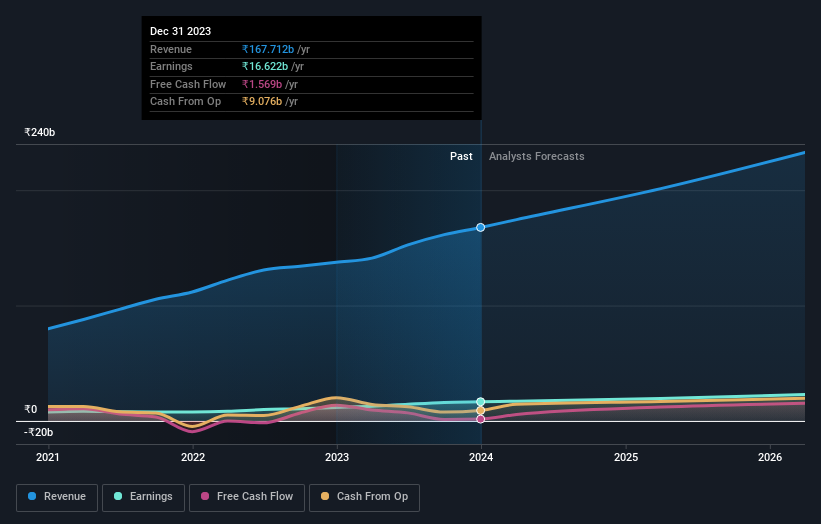- India
- /
- Electrical
- /
- NSEI:POLYCAB
Earnings Update: Polycab India Limited (NSE:POLYCAB) Just Reported Its Third-Quarter Results And Analysts Are Updating Their Forecasts

Investors in Polycab India Limited (NSE:POLYCAB) had a good week, as its shares rose 8.9% to close at ₹4,335 following the release of its third-quarter results. Revenues of ₹43b were in line with forecasts, although statutory earnings per share (EPS) came in below expectations at ₹27.40, missing estimates by 2.8%. Earnings are an important time for investors, as they can track a company's performance, look at what the analysts are forecasting for next year, and see if there's been a change in sentiment towards the company. So we collected the latest post-earnings statutory consensus estimates to see what could be in store for next year.
See our latest analysis for Polycab India

After the latest results, the 26 analysts covering Polycab India are now predicting revenues of ₹201.3b in 2025. If met, this would reflect a substantial 20% improvement in revenue compared to the last 12 months. Statutory earnings per share are predicted to grow 18% to ₹131. In the lead-up to this report, the analysts had been modelling revenues of ₹201.8b and earnings per share (EPS) of ₹131 in 2025. The consensus analysts don't seem to have seen anything in these results that would have changed their view on the business, given there's been no major change to their estimates.
There were no changes to revenue or earnings estimates or the price target of ₹5,220, suggesting that the company has met expectations in its recent result. It could also be instructive to look at the range of analyst estimates, to evaluate how different the outlier opinions are from the mean. Currently, the most bullish analyst values Polycab India at ₹6,430 per share, while the most bearish prices it at ₹3,970. These price targets show that analysts do have some differing views on the business, but the estimates do not vary enough to suggest to us that some are betting on wild success or utter failure.
One way to get more context on these forecasts is to look at how they compare to both past performance, and how other companies in the same industry are performing. We can infer from the latest estimates that forecasts expect a continuation of Polycab India'shistorical trends, as the 16% annualised revenue growth to the end of 2025 is roughly in line with the 17% annual growth over the past five years. By contrast, our data suggests that other companies (with analyst coverage) in a similar industry are forecast to see their revenues grow 19% per year. So it's pretty clear that Polycab India is expected to grow slower than similar companies in the same industry.
The Bottom Line
The most obvious conclusion is that there's been no major change in the business' prospects in recent times, with the analysts holding their earnings forecasts steady, in line with previous estimates. On the plus side, there were no major changes to revenue estimates; although forecasts imply they will perform worse than the wider industry. The consensus price target held steady at ₹5,220, with the latest estimates not enough to have an impact on their price targets.
Following on from that line of thought, we think that the long-term prospects of the business are much more relevant than next year's earnings. We have estimates - from multiple Polycab India analysts - going out to 2026, and you can see them free on our platform here.
You should always think about risks though. Case in point, we've spotted 3 warning signs for Polycab India you should be aware of, and 1 of them makes us a bit uncomfortable.
New: Manage All Your Stock Portfolios in One Place
We've created the ultimate portfolio companion for stock investors, and it's free.
• Connect an unlimited number of Portfolios and see your total in one currency
• Be alerted to new Warning Signs or Risks via email or mobile
• Track the Fair Value of your stocks
Have feedback on this article? Concerned about the content? Get in touch with us directly. Alternatively, email editorial-team (at) simplywallst.com.
This article by Simply Wall St is general in nature. We provide commentary based on historical data and analyst forecasts only using an unbiased methodology and our articles are not intended to be financial advice. It does not constitute a recommendation to buy or sell any stock, and does not take account of your objectives, or your financial situation. We aim to bring you long-term focused analysis driven by fundamental data. Note that our analysis may not factor in the latest price-sensitive company announcements or qualitative material. Simply Wall St has no position in any stocks mentioned.
About NSEI:POLYCAB
Polycab India
Manufactures and sells wires and cables under the POLYCAB brand in India and internationally.
Flawless balance sheet with limited growth.


